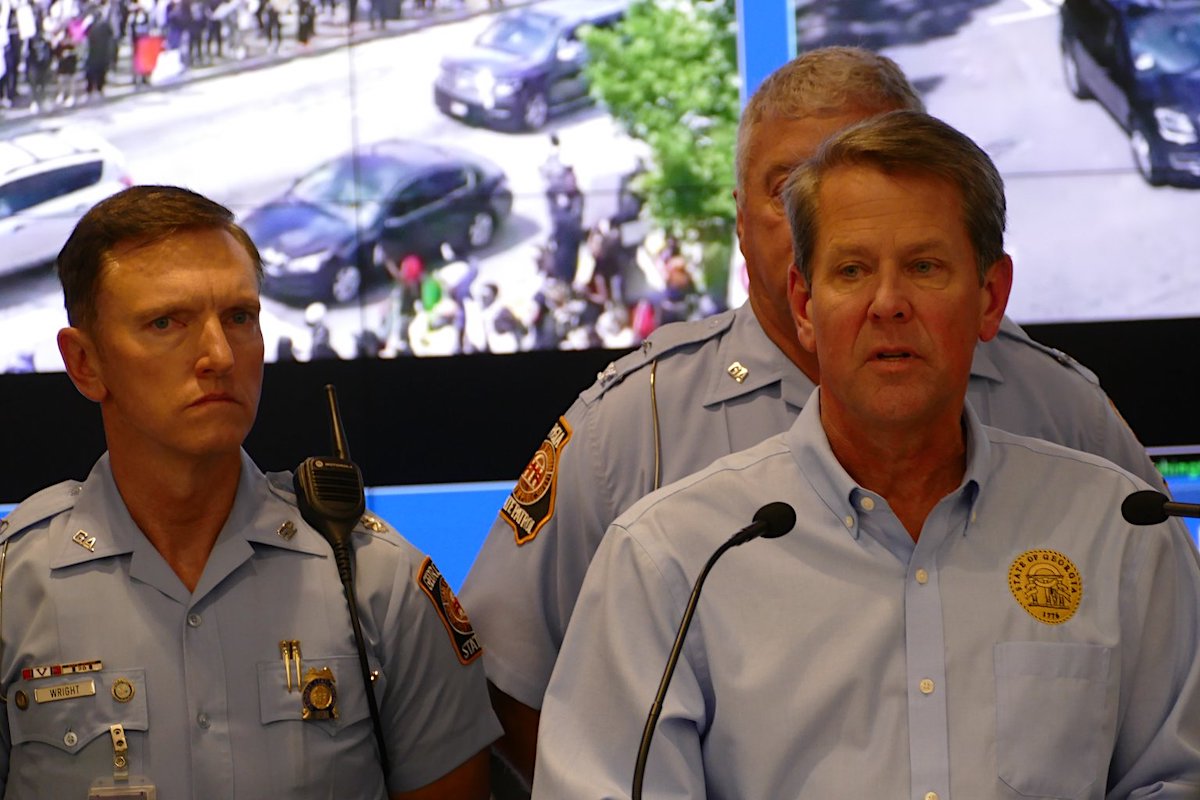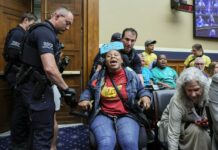
The three men accused in the slaying of Ahmaud Arbery are scheduled for a preliminary hearing in Brunswick Thursday and the governor is counting on the organizers of recent well-planned and calm Brunswick rallies for justice to keep the peace.
“We will take the appropriate actions to hold bad actors accountable if they try to infiltrate what has been very peaceful gatherings in that community for well over a month now,” Gov. Brian Kemp said Tuesday. “Let me be clear once again, we will not tolerate disruptive or dangerous behavior, including criminal conduct, and we will put the safety of our citizens first.”
Kemp talked about protests and law enforcement’s response from the Georgia Emergency Management and Homeland Security Agency headquarters in Atlanta, where a large split-screen featured live video of protesters in downtown Atlanta. Billed as an update on COVID-19, discussion of the Atlanta demonstrations that erupted into shattered glass and burning police cruisers dominated the 40-minute briefing. Other Georgia cities with protests include Augusta, Macon and Savannah.
The demonstrations stretch across the country every night lately in large public expressions of outrage over the violent deaths of African Americans, most recently including Arbery on Feb. 23, Breonna Taylor of Louisville on March 13 and George Floyd of Minneapolis on May 25. The three men accused of Arbery’s murder are white, arrested after more than two months when a video of the shooting went viral.
“During this unprecedented moment, we have witnessed injustice with our own eyes,” Kemp said of the slayings, adding that he understands why people are angry enough to take to the streets.
A rally is planned at the Glynn County Courthouse hours after Thursday’s scheduled hearing, the latest demonstration there to demand justice in the killing of the unarmed black jogger in the Satilla Shores neighborhood outside Brunswick.
After Atlanta’s Friday afternoon march from Centennial Park to the Capitol descended into violence and vandalism, law enforcement’s response toughened from police on bicycles to SWAT teams in riot gear. Over the weekend, Kemp authorized the deployment of 3,000 Georgia National Guard troops to help quell the unrest.

President Donald Trump threatened Monday to invoke the 1807 Insurrection Act to send federal troops to aid in putting down demonstrations in American cities, but there is no need for federal troops to patrol the streets of Georgia, Kemp said with Georgia National Guard Adjutant General Tom Carden at his side.
“If Gen. Carden tells me we need something, I’ll start worrying about it,” Kemp said.
Atlanta officials suggested over the weekend that much of the destruction along downtown storefronts from the College Football Hall of Fame, north along Peachtree Street and all the way to the Lenox Square area in Buckhead came at the hands of outsiders, perhaps even anarchists. But the arrest information released so far doesn’t support that claim. Georgia Bureau of Investigation Director Vic Reynolds said his agents’ investigations suggest a small number of agitators are infiltrating the peaceful protests in pursuit of a political agenda.
“I don’t want to misspeak or speak on something we’re not categorically sure of now, but I will tell you that we are convinced that, based on the information intelligence we have, there are individuals here from various groups around the country, a lot of which are bent primarily on destruction and violence,” Reynolds said.
An unfortunate potential side-effect of the demonstrations that gather 1,000 people and more is that they provide fertile territory for the spread of COVID-19, said Dr. Kathleen Toomey, Georgia’s public health commissioner.

“When you have this many people gathered together in close proximity, you run the risk of transmission,” she said. “I think you add to that the fact that individuals have come from out-of-state, where they maybe have even higher rates of infection and may be bringing it into our state and transmitting it as well.”
Toomey urged those who attended rallies in recent days to get tested for COVID-19.
Although the masks worn by protesters may have reduced the risk of spreading the disease, the big, tightly-packed crowds like those seen in Atlanta are high-risk places to transmit viruses, said Georgia State University public health professor Dr. Harry J. Heiman, and people who were infected at the demonstrations may already be spreading the virus to the people they live with.
“We know that people can get the infection and remain asymptomatic, without symptoms, and spread it,” he said. “Or they can get the infection and be pre-symptomatic, meaning a period where they have the infection, are infectious, but don’t have symptoms yet and can spread it. And that’s one of the challenges.”
Heiman said he was disappointed the governor did not spend more time updating the public on the ongoing pandemic during his remarks. The state public health department revised the format of its online coronavirus update and as of Wednesday it showed 2,102 deaths from COVID-19 in Georgia and 48,207 confirmed cases.
The protests in metro Atlanta and around the state continued to attract crowds by the hundreds Tuesday evening for the fifth time since riots erupted near CNN Center Friday night. Heiman is worried that the reopening of state businesses as coronavirus stay-home orders expire and the state public health department’s data suggesting an increase in the number of cases in the state is cause for public concern.
“The governor would like to explain this as entirely due to increased testing, but the reality is, we were doing increased testing and significantly ramping up our testing long before May 9, so is increased testing part of the answer? Sure, but there’s clearly an upward trend there. At very least, we’re plateauing,” he said.
For comprehensive coverage for news from around the state visit Georgia Recorder online







